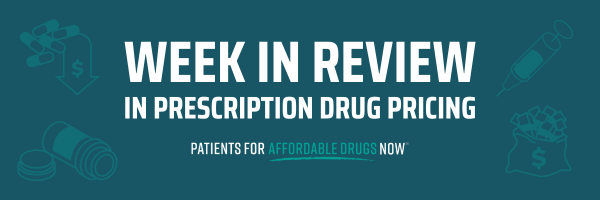
Historic things happening this summer: Barbie, Neopets relaunch, and Medicare releasing the names of 10 negotiated drugs. C’mon Barbie, time to check on your lower drug prices.
Welcome to the Week in Review.
1. Medicare Negotiation: Popular Provisions That Will Bring Relief
- In the latest attack on the Medicare negotiation law, this week Johnson & Johnson (J&J) joined the list of drug companies and trade groups filing bogus lawsuits. Clearly, J&J is scrambling to protect its bottom line, since its blockbuster blood thinner Xarelto may be selected for the first round of negotiation. But patients aren’t fooled! A poll released this week by Navigator Research reported that voters overwhelmingly support the drug price reforms in the Inflation Reduction Act, with 81 percent supporting the provision giving Medicare the power to negotiate for lower drug prices. The Center For American Progress (CAP) released a new analysis that highlights how Medicare negotiation will specifically help women, Black and Latino people, LGBTQI+ people, and disabled people. The report explains that Black and Latino people on Medicare are nearly two times more likely not to fill a prescription due to cost, and the Inflation Reduction Act will provide tangible relief. Patients aren’t the only ones benefiting from the Medicare negotiation program. At a press conference organized by Protect Our Care and Opportunity Wisconsin, Rep. Gwen Moore explained: “Not only does the Inflation Reduction Act provide affordable medications to people, but it actually reduces the deficit by billions, hundreds of billions of dollars.” With billions of dollars of savings at play, no wonder drug companies are pleading with the courts to preserve their bottom line. — (Navigator Research, Center For American Progress, Up North News)
2. Momentum Builds On PBM Reforms
- As Senate Majority Leader Schumer works on a health package to lower drug prices, momentum continues to build for Pharmacy Benefit Manager (PBM) reform. The Senate Finance Committee announced a markup of PBM legislation next week on July 26. Senators Tom Carper and Chuck Grassley introduced new legislation, the PBM Oversight Act of 2023, that would empower the federal government to increase oversight over PBMs’ practices. In the House, the Education and Workforce Committee passed a bipartisan package last week that included reforms to increase PBM transparency. Clearly, reforming PBMs is a priority in both chambers and across the aisle! The Federal Trade Commission (FTC) held a unanimous vote this week walking back its previous stance against PBM transparency. The writing is on the wall: PBMs can no longer hide behind trade secrets and proprietary data. It’s high time to shed light on the middlemen’s practices and it’s evident that bipartisan support for reforms has never been stronger. — (Axios, The Hill, Bloomberg Law)
3. Continuing The Push For Competition
- Following last week’s launch of the “Push For Competition To Lower Drug Prices,” P4ADNow is continuing to spread the word about the ways that Big Pharma abuses the system and why we urgently need the Senate to pass reforms. Through a social media campaign, P4ADNow is breaking down how drug corporations exploit the patent and regulatory systems with tactics like pay-for-delay deals, product hopping, and patent thickets to maintain their monopolies. Humira, the poster child for patent abuse, finally has competition after years of market exclusivity due to a combination of anti-competitive tactics. Humira’s competitors have the potential to drive lower drug prices to the market and provide relief to patients who’ve faced unjustified, high drug prices. “The introduction of seven alternatives to AbbVie Inc.‘s blockbuster drug Humira in July will be the most important test to date on whether market competition can bring down what patients pay for expensive biologics,”reported Bloomberg Law. While we wait to see how Humira biosimilars play out, we urgently call on the Senate to pass reforms that foster competition and crack down on abuse of the patent and regulatory systems to ensure they are serving patients first, instead of padding the pockets of Big Pharma. — (P4ADNow, NPR, Bloomberg Law)
BONUS: It’s been almost a year since the Inflation Reduction Act passed and despite Big Pharma fear mongering, drug companies seem to be doing just fine! This week, Novartis announced a $15 billion share buyback and J&J published its quarterly earnings, which increased 6.3% for a total of $25.5 billion in sales. What was that about not enough money for R&D? 👀
Have a great weekend!
